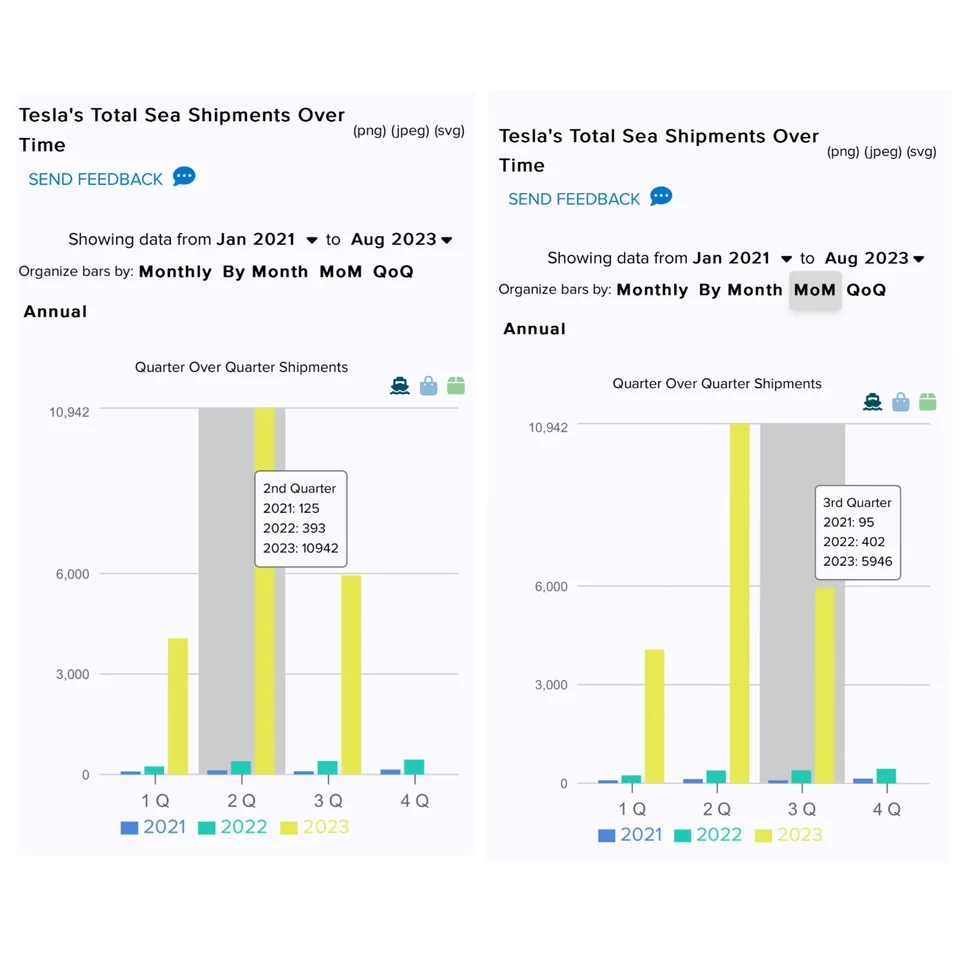In the world of electric vehicles, Tesla has always been the trailblazer, pushing the boundaries of innovation and sustainability.
However, even giants stumble occasionally, and the recent 45.67% drop in Tesla shipments from Q2 to Q3 has raised eyebrows and questions within the industry.
What’s causing this decline in deliveries? One crucial factor that’s emerged is the inability to finish and deliver cars without crucial parts from overseas.
The Surge and the Sudden Slump
Tesla’s journey has been nothing short of remarkable. From humble beginnings to becoming the world’s most valuable carmaker, the company has come a long way.
This ascent was punctuated by a surge in deliveries in Q2, which was a record-breaking quarter for the company.
Investors and enthusiasts were thrilled, but the joy was short-lived as Q3 brought with it an unexpected and alarming drop of nearly 46% in shipments.
The Missing Pieces
To understand this sharp decline, we need to delve into the intricate web of global supply chains that sustain the automotive industry.
Tesla, like most car manufacturers, relies on a vast network of suppliers to provide the various components necessary for vehicle production. However, in recent times, this supply chain has been fraught with challenges.
Crucial parts, particularly semiconductor chips and batteries, are sourced from overseas suppliers. The global semiconductor shortage has been well-documented, affecting industries far and wide.
The shortage of these tiny but critical chips has forced Tesla, like many other automakers, to slow down production or even halt it at times.
Similarly, the supply of batteries, an essential component for electric vehicles, has been strained due to increased demand and limited production capacities.
Tesla’s Gigafactories, which produce batteries at a massive scale, have faced their share of delays and bottlenecks.

The Impact on Tesla Shipments
Tesla’s dependence on these overseas suppliers has left them vulnerable to disruptions in the supply chain. When the flow of crucial parts slows down, it creates a ripple effect throughout the production process.
Cars cannot be completed without all their parts, and this leads to a delay in shipments.
In Q3, this became painfully evident. The scarcity of semiconductors and batteries led to a backlog in production. Cars that were ready for assembly couldn’t be completed, leading to a significant drop in shipments.
Customers eagerly waiting for their vehicles were left disappointed as delivery timelines were pushed back.
The Way Forward
So, what lies ahead for Tesla? The electric vehicle market is more competitive than ever, with new players entering the scene regularly. To maintain its dominance and recover from the Q3 setback, Tesla needs to address its supply chain vulnerabilities.
- Diversify Suppliers: Tesla could consider diversifying its supplier base, reducing its dependence on a single source for crucial components. This strategy can help mitigate future supply chain disruptions.
- Invest in Local Production: Expanding local production of critical components like semiconductor chips and batteries could provide Tesla with greater control over its supply chain. It would also reduce the impact of global disruptions.
- Resilience and Adaptation: The ability to adapt quickly to changing market conditions and supply chain disruptions is crucial. Tesla should focus on developing agile production processes that can pivot when needed.
Tesla‘s 45.67% drop in shipments from Q2 to Q3 serves as a stark reminder that even the most innovative and successful companies are not immune to global supply chain challenges.
The inability to finish and deliver cars without crucial parts from overseas has been a significant factor in this decline.
However, with its history of resilience and innovation, Tesla is well-positioned to overcome these challenges and continue its journey towards a sustainable and electrified future.

